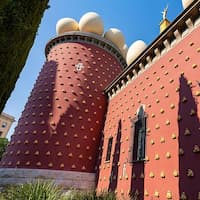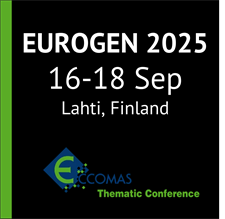events
[VIDEO AVAILABLE] CIMNE Coffee Talk: "Destination Earth, an EU initiative full of opportunities" by Pere-Andreu Ubach, Laurence Sigler, and Míriam Méndez
ABSTRACT
The Destination Earth Initiative (DestinE) has completed the first phase and the platform is now online. In this Coffee Talk, the CIMNE Team that has implemented two use cases of the capabilities of DestinE's Data Lake will reflect on the initiative, will present their views on the platform and will share their experiences. The Platform is now open for registration for researchers, developers and users, who can exploit the services it provides. During this CIMNE Coffee, we will only skim the surface of the possibilities offered by Destination Earth. But the aim is to provide a glimpse enough for researchers, students and managers alike to understand how everybody can benefit from Destination Earth.
SPEAKERS' CV
 Dr. Pere-Andreu Ubach is a Research Engineer at CIMNE's Structural Mechanics group, part of the Structural and Particle Mechanics research cluster. Since 2006 he has combined research and collaboration with CIMNE. From 2008 to 2013, he served as Deputy Director of CIMNE. He has participated in numerous research projects both by the European Commission and other international agencies such as the Office of Naval Research (USA) and multinational companies. Member of the coordination team of the PIKSEL project and specifically in Challenge 2 for predicting the evolution of the coast. He has recently coordinated the project for 2 use cases on Destination Earth's Data Lake.
Dr. Pere-Andreu Ubach is a Research Engineer at CIMNE's Structural Mechanics group, part of the Structural and Particle Mechanics research cluster. Since 2006 he has combined research and collaboration with CIMNE. From 2008 to 2013, he served as Deputy Director of CIMNE. He has participated in numerous research projects both by the European Commission and other international agencies such as the Office of Naval Research (USA) and multinational companies. Member of the coordination team of the PIKSEL project and specifically in Challenge 2 for predicting the evolution of the coast. He has recently coordinated the project for 2 use cases on Destination Earth's Data Lake.
His current research interest is focused on protecting beaches from their gradual and progressive erosion. Laurence Sigler has been at the International Centre for Numerical Methods in Engineering (CIMNE) since 2021, where he is also obtaining a PhD in Civil Engineering from the Polytechnic University of Catalonia (UPC). He holds an MSc in Geographic Information Science from the Autonomous University of Barcelona (UAB). His previous experience includes working in the private sector as a GIS analyst and in database engineering in Europe and the US.
Laurence Sigler has been at the International Centre for Numerical Methods in Engineering (CIMNE) since 2021, where he is also obtaining a PhD in Civil Engineering from the Polytechnic University of Catalonia (UPC). He holds an MSc in Geographic Information Science from the Autonomous University of Barcelona (UAB). His previous experience includes working in the private sector as a GIS analyst and in database engineering in Europe and the US.
His research is on content management, reusability, and interoperability of resources - such as data, models, and simulations - for Decision Support Systems (DSS), Geographic Information Systems (GIS), and Digital Twins (DT), to facilitate scientific collaboration and analysis, principally focused on climatology. Míriam Méndez is a Research Engineer at the Building, Energy, and Environment (BEEGroup) innovation unit at CIMNE. In 2018, she began studying Computer Engineering, specialising in Computing at the FIB, where she published her first conference at Eurographics. In 2022, she started a Master's in Data Science at the FIB, during which she completed an international stay at Chalmers University of Technology in Sweden to deepen her knowledge in Deep Learning.
Míriam Méndez is a Research Engineer at the Building, Energy, and Environment (BEEGroup) innovation unit at CIMNE. In 2018, she began studying Computer Engineering, specialising in Computing at the FIB, where she published her first conference at Eurographics. In 2022, she started a Master's in Data Science at the FIB, during which she completed an international stay at Chalmers University of Technology in Sweden to deepen her knowledge in Deep Learning.





















